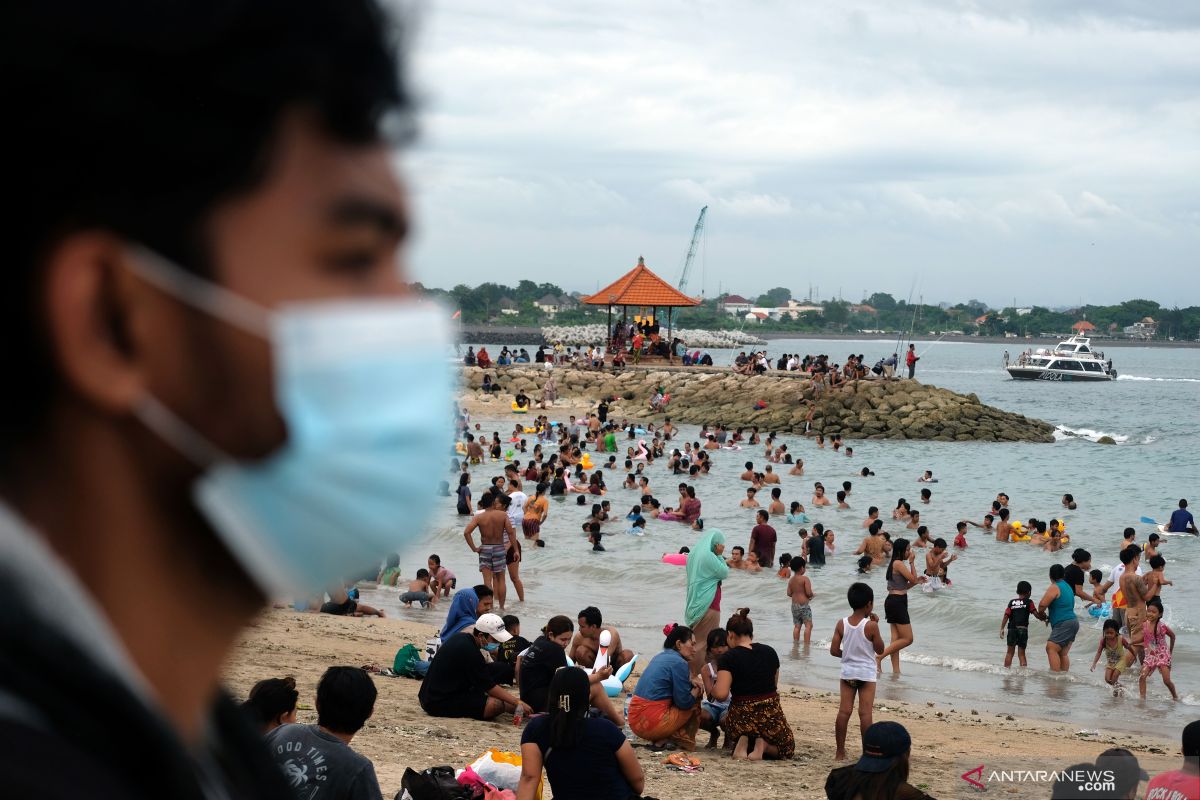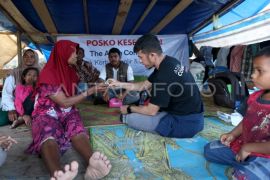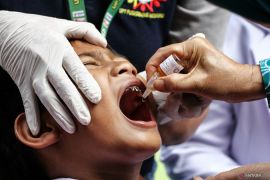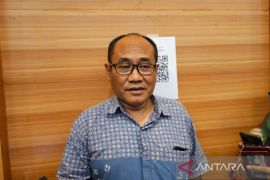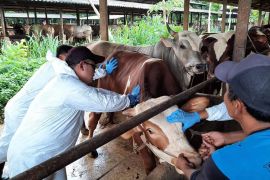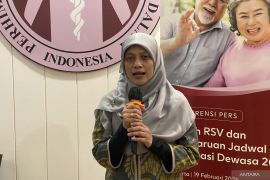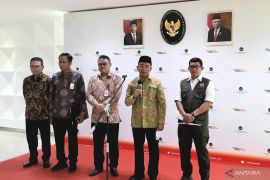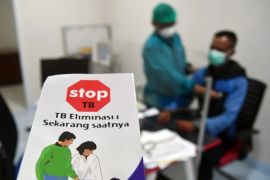In such conditions, the Indonesian economy had contracted 2.07 percent last year as compared to that in 2019, according to data from Statistics Indonesia (BPS).
However, in line with the successful efforts to control the COVID-19 pandemic, the Indonesian government has begun to ease curbs on community activities, including economic activities. In the second quarter of 2021, the national economy began to clock positive growth to reach 7.07 percent year-on-year (yoy).
Related news: Realisation of national recovery programme reaches Rp533.6 trillion
Head of BPS Margo Yuwono remarked that this growth was driven by the government's intensive efforts to implement vaccination programs to gain the public’s confidence in returning back to normal life.
In 2021, the Indonesian government targeted to administer the full dosage of COVID-19 vaccination to as many as 208.2 million citizens in order to form herd immunity.
Concurrently, economic growth in the second quarter of 2021 was also influenced by an improvement in the global economy, especially in several countries, as Indonesia's trading partners, such as China, which grew 7.9 percent; Singapore, 14.3 percent; South Korea, 5.9 percent; and Vietnam, 6.6. percent.
The influence of these countries' economic growth on Indonesia can also be seen from the increase in the exports of goods and services that clocked the highest growth of 31.78 percent yoy in the second quarter of 2021.
Related news: Trade Ministry committed to supporting East Kalimantan's exports
Delta variant
However, since the end of May 2021, the number of positive COVID-19 cases in Indonesia have again started to increase until hitting the peak on July 6-12, 2021, with weekly positive cases of COVID-19 reaching 253,600 people.
The government noted that the second wave of COVID-19 in Indonesia was caused by the high mobility of people during Eid and the spread of the COVID-19 new variant called Delta.
In an effort to tackle the increasing number of COVID-19 cases, the government again tightened community mobility by imposing Emergency Community Activity Restrictions (PPKM) in Java and Bali on July 3-20, 2021.
During that time, workers in non-essential sectors were required to work from home. Teaching and learning activities also had to be conducted online.
Meanwhile, in the essential sectors, office capacity was limited to a maximum of 50 percent, with the implementation of health protocols. Only critical sector workers were allowed 100 percent to work in the office.
Related news: No one to be left behind in COVID recovery: Hartarto
The essential sectors comprised finance and banking, capital markets, payment systems, information and communication technology, non-COVID-19 quarantine hotels, and export-oriented industries.
Meanwhile, the critical sectors were energy, health, security, logistics and transportation, food, beverage and supporting industries, petrochemical industry, cement, national vital objects, disaster mitigation, national strategic projects, construction, basic utilities, as well as other basic needs of the community.
The government allowed supermarkets, traditional markets, and grocery stores to operate until 8 p.m. local time, with 50-percent visitor capacity, but modern shopping centers or malls had to stay shut.
Related news: Jakarta is Indonesia's economic hub: BI Governor
Emergency PPKM in Java and Bali continued to be implemented until August 2021, with a decline in community activities. Economic growth in the third quarter of 2021 also declined as compared to the previous quarter.
Furthermore, the government designated several levels for PPKM, wherein the highest level was only applied in areas with high number of positive cases of COVID-19. Hence, in the third quarter of 2021, economic growth of 3.51 percent yoy was recorded. This figure was lower than the previous quarter's economic growth of 7.07 percent.
Yuwono noted that economic slowdown in the third quarter of 2021 was also experienced by some of Indonesia's trading partner countries, such as China, which grew by 4.9 percent; the United States, 4.9 percent; Singapore, 6.5 percent; South Korea, four percent; Hong Kong, 5.4 percent; and the European Union, 3.9 percent.
Balancing COVID-19 control mechanisms
Taking a cue from the second wave of COVID-19, the government has been solemnly intensifying testing, tracing, and treatment as well as expediting vaccination. After the number of positive cases began to decline, the government was determined to implement a brake and gas policy to help the economy grow while COVID-19 transmission was kept under control.
In the fourth quarter of 2021, people keen on travelling were not mandated to show travel references though had to be fully vaccinated against COVID-19 as proven by a vaccine certificate, both in printed form and on the PeduliLindungi application.
This application was also used to monitor the capacity of a building or room that should not be full in order to maintain social distancing between people.
Hence, Secretary of the Coordinating Ministry for Economic Affairs Susiwijono was optimistic of the national economy clocking a growth of over five percent in the fourth quarter of 2022.
"Along with the declining number of cases of COVID-19 in several regions, community mobility has increased again and has made various sectors, especially the trade sector, to bounce back," Susiwijono remarked.
Indicators of economic improvement were also apparent from a decline in the middle-class savings in banks, thereby indicating increased public consumption, Susiwijono stated.
Similarly, economist at the Center of Reform on Economics (CORE) Yusuf Rendy Manilet projected the national economy to grow by around five to six percent yoy in the fourth quarter of 2021.
Indonesia’s economic performance in the fourth quarter of 2021 was better than that in the previous quarter, as indicated by the Consumer Confidence Index (IKK) and retail sales surveys.
IKK in October 2021 reached 113, or exceeded 100, as an optimistic point of consumer confidence. The October 2021 IKK also exceeded the IKK value of 95.5 in September 2021.
The positive trend was also apparent in the retail sales survey that grew 10.1 percent yoy, driven by sales of the Vehicle Fuel Group and the Food, Beverage, and Tobacco Group.
"The improvement in these two main indicators is inseparable from the easing of PPKM by the government and also in line with the slowing trend of COVID-19 cases throughout October and November,” Manilet stated.
He assessed that sectors to record growth in the fourth quarter of 2021 are the manufacturing industry that is supported by domestic and foreign demand. Furthermore, the mining sector continues to grow due to the upward trend in commodity prices as a result of high demand for certain commodities. Meanwhile, the trade sector is also projected to grow as supported by the PPKM easing policy.
Manilet also projects economic growth to lie in the positive range of 3.6 to four percent yoy during 2021.
He reminded the government to always implement the right policies in striking a balance in controlling the COVID-19 pandemic whilst concurrently maintaining performance of the national economy.
Related news: Ministry expedites infrastructure development for economic recovery
Related news: Optimizing government assistance for economic recovery
Translator: Sanya Dinda S, Resinta S
Editor: Fardah Assegaf
Copyright © ANTARA 2021
